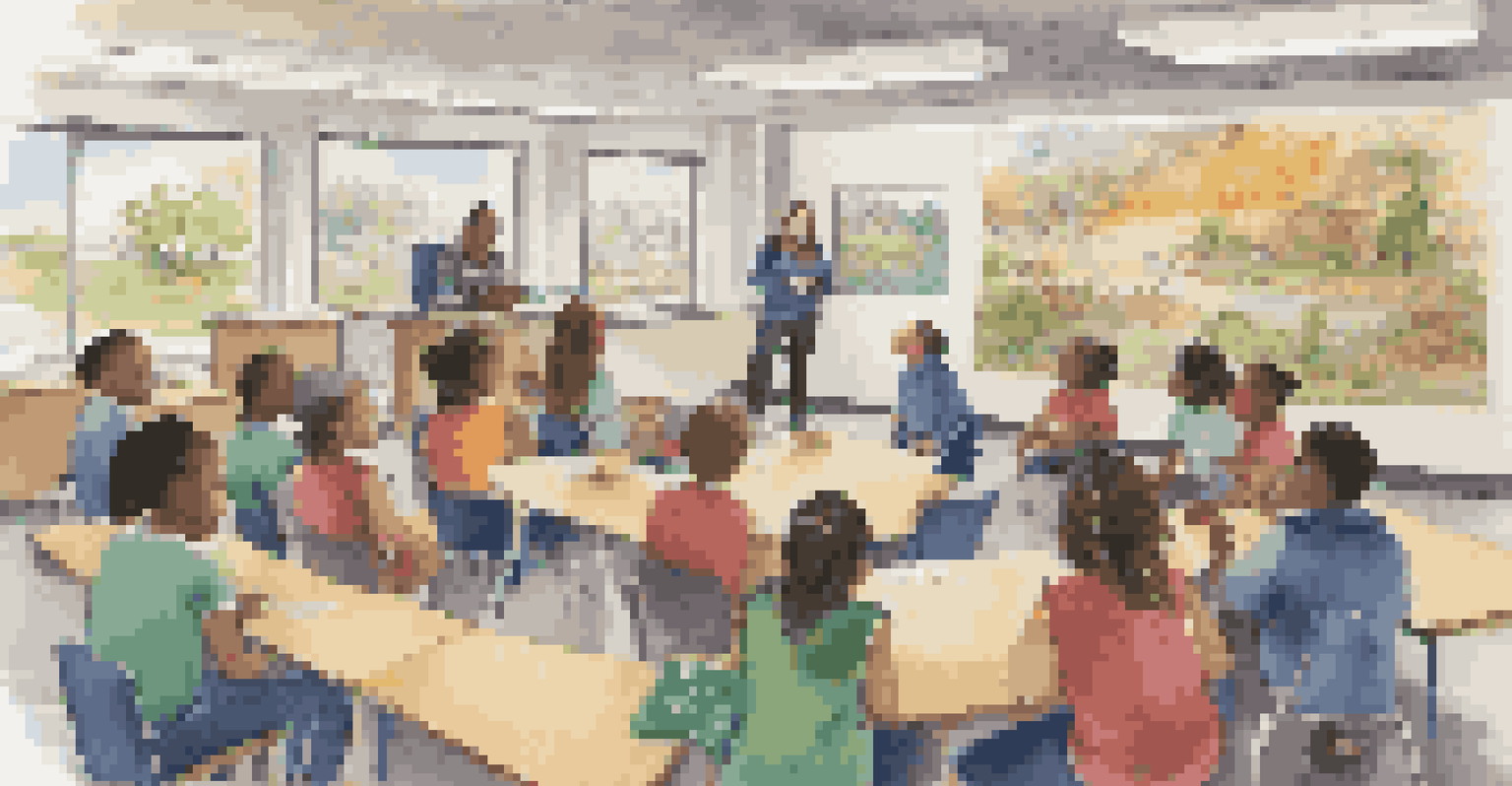The Influence of Community Engagement in Constructivist Learning

Understanding Constructivist Learning: A Foundation
Constructivist learning is an educational philosophy that emphasizes the role of learners in constructing their own understanding and knowledge. Instead of passively receiving information, students engage actively with the material, often through collaboration and dialogue. This approach aligns perfectly with learning theories that prioritize experience and reflection, making it a dynamic process for personal growth and understanding.
Tell me and I forget. Teach me and I remember. Involve me and I learn.
At the heart of constructivist learning is the belief that knowledge is not a preset package to be delivered; rather, it is a construct built by the learner's experiences. This means that learners draw upon their backgrounds, insights, and interactions to shape their understanding. It’s much like building a house—each brick (or experience) contributes to the overall structure of knowledge.
By embracing this philosophy, educators can create environments that foster critical thinking and creativity. This is where community engagement becomes a pivotal element, enhancing the learning experience and promoting a deeper connection to the material.
The Role of Community Engagement in Learning
Community engagement refers to the collaboration between educational institutions and the broader community. This partnership can take many forms, such as service-learning projects, mentorship programs, or collaborative workshops. The goal is to create a mutually beneficial relationship where both students and community members learn from one another.

When students engage with their communities, they are exposed to real-world challenges and diverse perspectives. This not only enriches their learning experience but also helps them develop essential skills such as empathy, communication, and teamwork. It’s akin to stepping outside the classroom to experience life, making education more relevant and impactful.
Constructivist Learning Empowers Students
This educational philosophy encourages learners to actively construct their understanding through experiences and collaboration.
Moreover, community engagement encourages students to apply their theoretical knowledge in practical situations. This hands-on approach solidifies their understanding and promotes a sense of responsibility towards their community, reinforcing the idea that learning extends beyond academic borders.
Building a Sense of Belonging Through Collaboration
One of the most significant benefits of community engagement in constructivist learning is the sense of belonging it fosters among students. When learners collaborate with peers and community members, they build relationships that enhance their social skills and emotional intelligence. This collaboration transforms learning into a shared journey, where everyone contributes and learns from each other.
Education is not the filling of a pail, but the lighting of a fire.
For instance, consider a group of students working on a community garden project. They not only learn about horticulture and sustainability but also collaborate, negotiate, and resolve conflicts as a team. These experiences are invaluable and create a supportive learning environment where students feel valued and connected.
In essence, this sense of belonging is crucial for fostering a positive learning atmosphere. When students feel like they are part of a larger community, their motivation and engagement levels rise, leading to more profound learning outcomes.
Enhancing Critical Thinking Through Real-World Issues
Community engagement often involves tackling real-world problems, which naturally enhances critical thinking among students. When learners are presented with authentic challenges, they must analyze situations, consider various viewpoints, and develop solutions. This process is integral to constructivist learning, where inquiry and exploration are encouraged.
For example, students might work on a project addressing local environmental concerns, requiring them to research, evaluate data, and propose actionable solutions. Such tasks push them to think critically and creatively, sharpening their analytical skills in a practical context.
Community Engagement Enhances Learning
By connecting with their communities, students gain real-world perspectives, develop essential skills, and apply theoretical knowledge in meaningful ways.
This engagement with real-world issues not only makes learning more relevant but also prepares students for future challenges. It cultivates a mindset that values problem-solving and innovative thinking, both essential skills in today's complex world.
Fostering Lifelong Learning and Community Responsibility
Engaging with the community nurtures a sense of lifelong learning in students. When they see the impact of their contributions, it instills a desire to continue seeking knowledge and skills beyond the classroom. This mindset is essential in our rapidly changing world, where adaptability and continuous growth are vital.
Additionally, community engagement teaches students the importance of civic responsibility. By participating in community initiatives, they learn the value of giving back and understanding their role within a larger society. This sense of responsibility can lead to more active and engaged citizens who are committed to making a difference.
Ultimately, this commitment to lifelong learning and community involvement shapes a generation of learners who are not only knowledgeable but also socially aware and proactive in addressing societal issues.
Challenges of Community Engagement in Education
While the benefits of community engagement in constructivist learning are clear, there are challenges that educators must navigate. One major hurdle is the logistics of coordinating community projects, which can be time-consuming and resource-intensive. Teachers often need to balance curriculum requirements with community engagement efforts, making it essential to find a harmonious integration.
Another challenge is ensuring that all students have equal access to community engagement opportunities. Factors such as socio-economic status or geographical location can affect participation, leading to disparities in learning experiences. Educators must be mindful of these barriers and strive to create inclusive opportunities for all students.
Challenges Must Be Addressed
While community engagement offers significant benefits, educators face logistical and accessibility challenges that must be managed for equitable opportunities.
Despite these challenges, the potential rewards of community engagement far outweigh the difficulties. By addressing these obstacles proactively, educators can create enriching experiences that benefit both students and their communities.
The Future of Community Engagement in Education
As we look to the future, community engagement is poised to play an increasingly critical role in education. With the rise of technology and digital platforms, there are new avenues for collaboration and connection between students and their communities. Virtual volunteering and online mentorship programs are just a few examples of how education can evolve to meet the needs of today's learners.
Moreover, the emphasis on social and emotional learning in schools aligns seamlessly with community engagement initiatives. By fostering connections between students and their communities, educators can support the holistic development of learners, preparing them for the complexities of modern life.

In conclusion, the integration of community engagement into constructivist learning environments is not merely a trend; it’s a necessary evolution in education. By embracing this approach, we can cultivate a generation of learners who are not only knowledgeable but also compassionate, responsible, and engaged citizens.